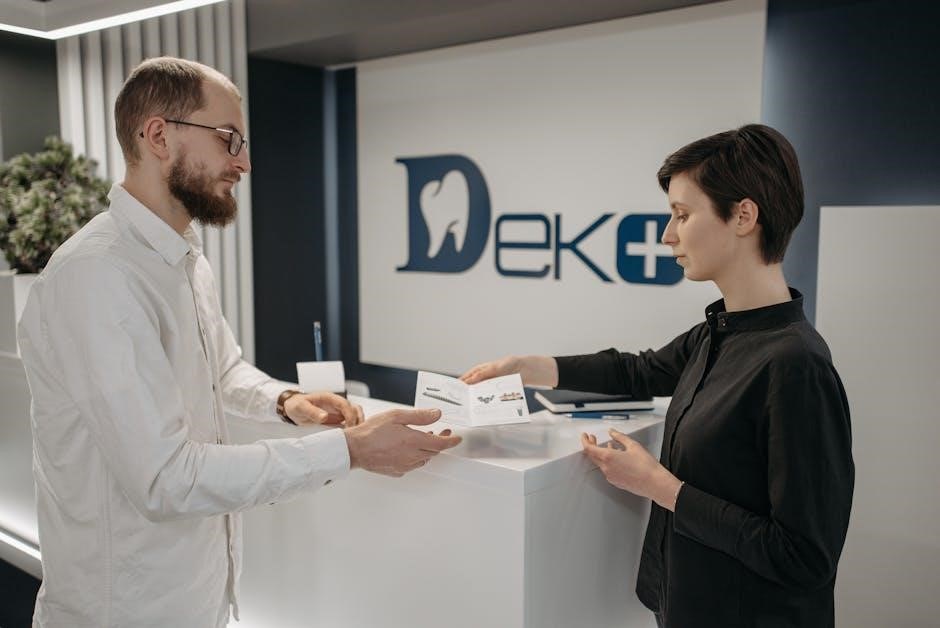The Importance of Dental Front Desk Training in Patient Experience
A well-trained front desk team is crucial for creating positive first impressions, ensuring efficient patient flow, and maintaining confidentiality, all of which enhance overall patient satisfaction and practice success.
1.1. The Role of the Front Desk in First Impressions
The front desk plays a pivotal role in shaping patients’ first impressions of a dental practice. As the initial point of contact, the front desk team sets the tone for the entire experience. Their professionalism, friendliness, and efficiency in handling check-ins, appointments, and patient inquiries directly influence how patients perceive the practice. A warm greeting, clear communication, and organized processes create a welcoming atmosphere, ensuring patients feel valued and confident in the care they will receive. This initial interaction often determines patient satisfaction and loyalty, making it a critical component of practice success.
1.2. How Front Desk Staff Influence Patient Satisfaction
Front desk staff significantly impact patient satisfaction through their communication skills, problem-solving abilities, and attention to detail. Their role in efficiently managing appointments, addressing concerns, and ensuring clear communication fosters trust and confidence. Positive interactions, such as warm greetings and empathetic responses, create a welcoming environment, while transparency in handling billing and insurance builds patient trust. By resolving issues promptly and maintaining a professional demeanor, front desk staff enhance the overall patient experience, directly contributing to higher satisfaction levels and long-term loyalty to the practice.

Essential Skills for Dental Front Desk Staff
Effective communication, organizational skills, and technical knowledge are vital. Staff must manage schedules, handle insurance, and maintain patient confidentiality while using EHR systems efficiently.
2.1. Communication and Patient Interaction Techniques
Effective communication is key to building trust and ensuring patient satisfaction. Front desk staff should use clear, empathetic language, actively listen, and adapt their approach to meet diverse patient needs. Training should emphasize techniques like de-escalation, positive body language, and cultural sensitivity. Regular workshops or role-playing exercises can help refine these skills, ensuring a welcoming and professional environment for all patients. Clear communication fosters confidence and strengthens the patient-practice relationship, making it a cornerstone of dental front desk training.
2.2. Organizational and Time Management Abilities
Organizational and time management skills are vital for front desk efficiency. Staff must master tasks like scheduling, patient flow, and multitasking to ensure smooth operations. Training should focus on prioritizing tasks, using digital calendars, and maintaining accurate records. Effective organizational skills reduce delays, minimize errors, and enhance patient satisfaction. By streamlining workflows and managing time wisely, front desk teams can handle multiple responsibilities seamlessly, contributing to a well-run dental practice and positive patient experiences.

Key Components of a Dental Front Desk Training Manual
A comprehensive manual includes patient flow management, scheduling, insurance handling, and technology integration. It also covers HIPAA compliance, EHR systems, and continuous training for optimal front desk performance.
3.1. Patient Flow Management and Scheduling
Effective patient flow management and scheduling are critical for a smooth dental practice operation. A well-structured training manual ensures front desk staff can efficiently manage check-ins, appointments, and wait times. Proper scheduling techniques, such as balancing patient volume and staffing, help minimize delays. Clear communication with patients about arrival times and procedure lengths is essential. Additionally, leveraging technology, like practice management software, streamlines scheduling and reduces errors. A well-organized workflow enhances patient satisfaction and ensures the practice runs seamlessly, contributing to overall success.
3.2. Handling Insurance and Billing Processes
Accurate and efficient handling of insurance and billing processes is vital for a smooth dental practice operation. Front desk staff must verify insurance eligibility, understand coverage details, and explain billing procedures clearly to patients. Ensuring compliance with HIPAA regulations while managing patient payments is essential. Utilizing practice management software can streamline billing, reduce errors, and improve transparency. Proper documentation and timely follow-ups on claims help maintain financial stability and patient trust, ensuring a seamless and professional experience for all parties involved.

HIPAA Compliance and Confidentiality Training
HIPAA compliance and confidentiality training are essential for front desk staff to protect patient data, ensuring all interactions adhere to strict privacy regulations and maintain trust.
4.1. Understanding HIPAA Regulations
Understanding HIPAA regulations is vital for dental front desk staff to ensure patient data privacy. HIPAA mandates strict guidelines for handling protected health information (PHI), including medical records and billing details. Staff must grasp key principles like patient consent, secure data storage, and authorized disclosure. Training emphasizes recognizing potential breaches and implementing safeguards; Compliance protects patient trust and avoids legal penalties, making it a cornerstone of ethical dental practice management. Proper training ensures front desk teams adhere to these standards seamlessly in daily operations.
4.2. Maintaining Patient Confidentiality
Maintaining patient confidentiality is a critical aspect of dental front desk training. Front desk staff must ensure that sensitive patient information, such as medical records and billing details, is accessed only on a need-to-know basis. Training emphasizes secure storage of documents and cautious handling of conversations to prevent unintentional disclosure. Breaches of confidentiality can damage patient trust and lead to legal consequences. Proper protocols, such as encrypting digital records and limiting access, are essential to safeguard patient privacy and uphold ethical standards in dental practice management.

Technology Integration in Front Desk Operations
Effective integration of EHR systems and Practice Management Software (PMS) streamlines patient flow, billing, and scheduling. Training ensures front desk staff efficiently use technology to enhance patient care and office productivity.
5.1. Electronic Health Records (EHR) Systems
Electronic Health Records (EHR) systems are essential for streamlining patient data access, improving accuracy, and enhancing communication. Front desk staff must be trained to efficiently navigate EHR systems, ensuring seamless integration with practice management software (PMS) for scheduling, billing, and patient records. EHR training focuses on real-time data access, reducing errors, and maintaining HIPAA compliance. By mastering EHR functionality, front desk teams can improve patient care coordination, streamline workflows, and enhance overall practice efficiency while ensuring secure and organized patient information management.
5.2. Practice Management Software (PMS)
Practice Management Software (PMS) is vital for efficient dental office operations. It streamlines scheduling, billing, and insurance claims while enhancing patient engagement. Front desk staff must be trained to use PMS effectively, ensuring accurate data entry, appointment management, and financial transactions. Integrating PMS with EHR systems improves workflow efficiency and reduces administrative errors. Proper training on PMS tools enables the front desk to optimize patient flow, manage records securely, and maintain smooth communication between patients and dental teams, ultimately enhancing practice productivity and patient satisfaction.
Continuous Training and Development
Continuous training ensures front desk staff stay updated on skills, patient engagement, and technology, fostering a culture of excellence and adaptability in dental practices.
6.1. Ongoing Education for Front Desk Staff
Ongoing education is essential for front desk staff to stay updated on best practices, patient engagement strategies, and regulatory compliance. Regular training sessions, workshops, and online courses ensure staff adapt to new technologies and procedures. Dental front desk training manuals serve as valuable resources, covering topics like EHR systems, patient flow management, and HIPAA compliance. Continuous learning fosters confidence and competence, enabling staff to provide exceptional patient experiences and support practice growth effectively.
6.2. Performance Monitoring and Feedback
Performance monitoring ensures front desk staff maintain high standards of efficiency and patient care. Regular assessments and feedback loops help identify areas for improvement, fostering professional growth. By tracking progress and addressing challenges promptly, practices can enhance overall operations. Constructive feedback empowers staff to refine their skills, improving patient interactions and office productivity. This continuous improvement cycle is vital for sustaining a well-trained and motivated front desk team that contributes to the practice’s success and patient satisfaction.
A well-trained front desk team elevates dental practice success by enhancing patient satisfaction, improving efficiency, and ensuring compliance, ultimately driving long-term growth and a positive reputation.
7.1. The Impact of Well-Trained Front Desk Staff
Well-trained front desk staff significantly enhance dental practice success by creating positive first impressions, ensuring efficient patient flow, and maintaining confidentiality. Their expertise in handling insurance, scheduling, and patient communication fosters trust and satisfaction. A skilled front desk team streamlines operations, reduces errors, and ensures compliance with regulations like HIPAA. Their ability to manage patient interactions and resolve issues promptly contributes to a practice’s reputation and long-term growth. Effective training empowers staff to excel in their roles, directly improving patient experience and practice profitability.
7.2. Best Practices for Implementing Training Manuals
Implementing training manuals effectively requires a structured approach, starting with clear role assessments and job postings. Use interactive tools like checklists and microlearning courses to engage staff. Regularly update manuals to reflect industry changes and patient needs. Monitor progress through feedback and performance evaluations. Provide ongoing education to ensure staff remain proficient in areas like HIPAA compliance and patient communication. By fostering a culture of continuous learning, practices can ensure their front desk team excels, enhancing both patient satisfaction and operational efficiency.